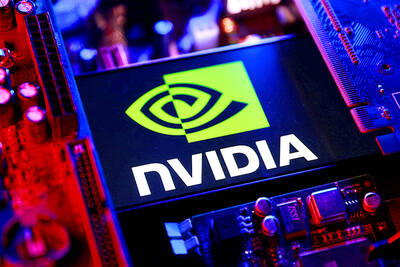LG Electronics Inc yesterday unveiled a new range of energy-saving home appliances, as the South Korean company aims to secure a double-digit market share in Taiwan next year.
“The ‘smart home appliance range’ will meet users’ expectations, with innovative technologies and energy-saving features that maximize convenience and create greater add-on value for users,” LG Electronics Taiwan president and chief executive Kim Byung-hyung said at the launch of the firm’s new refrigerators and washing machines.
Different from existing products on the market, LG’s new flagship 826-liter refrigerator, named the GR-D82B and priced at NT$99,000 (US$3,405.57), has a smart filtering system that can filtrate nearly 100 percent of harmful bacteria and eliminate odors through four filtration processes, the company said.
LG also launched three medium-sized models of refrigerators, priced between NT$33,490 and NT$35,490, hoping the new products will boost its refrigerator market share to 10 percent next year from this year’s 7 percent, the company said.
In addition, LG yesterday unveiled a new washing machine, which is designed to wash up to 17kg of clothes per cycle, and said it expected to see its washing machine market share increase to 25 percent next year from 20 percent this year.
Moon Kyung-jin, home appliance product marketing director at LG, said all the new products will hit the market by the end of the year, and that the company will be launching a 66-liter washing machine in May next year.
LG expects to see its overall sales in Taiwan grow by 20 percent next year, mainly driven by TVs and smartphones, Kim said.
Kim forecast that the home appliance market would remain flat next year, but that demand for 47-inch screen TVs would continue to grow.
Kim said LG will ship more than 1 million TVs next year to increase its global market share to 20 percent from this year’s 10 percent, as he expects the global penetration rate of larger TV’s will hit 50 percent next year.

POWERING UP: PSUs for AI servers made up about 50% of Delta’s total server PSU revenue during the first three quarters of last year, the company said Power supply and electronic components maker Delta Electronics Inc (台達電) reported record-high revenue of NT$161.61 billion (US$5.11 billion) for last quarter and said it remains positive about this quarter. Last quarter’s figure was up 7.6 percent from the previous quarter and 41.51 percent higher than a year earlier, and largely in line with Yuanta Securities Investment Consulting Co’s (元大投顧) forecast of NT$160 billion. Delta’s annual revenue last year rose 31.76 percent year-on-year to NT$554.89 billion, also a record high for the company. Its strong performance reflected continued demand for high-performance power solutions and advanced liquid-cooling products used in artificial intelligence (AI) data centers,

SIZE MATTERS: TSMC started phasing out 8-inch wafer production last year, while Samsung is more aggressively retiring 8-inch capacity, TrendForce said Chipmakers are expected to raise prices of 8-inch wafers by up to 20 percent this year on concern over supply constraints as major contract chipmakers Taiwan Semiconductor Manufacturing Co (TSMC, 台積電) and Samsung Electronics Co gradually retire less advanced wafer capacity, TrendForce Corp (集邦科技) said yesterday. It is the first significant across-the-board price hike since a global semiconductor correction in 2023, the Taipei-based market researcher said in a report. Global 8-inch wafer capacity slid 0.3 percent year-on-year last year, although 8-inch wafer prices still hovered at relatively stable levels throughout the year, TrendForce said. The downward trend is expected to continue this year,

‘BASICALLY A BAN’: Sources said the wording governing H200 imports from officials was severe, but added that the regulations might change if the situation evolves Chinese customs authorities told customs agents this week that Nvidia Corp’s H200 artificial intelligence (AI) chips are not permitted to enter China, three people briefed on the matter said. Chinese government officials also summoned domestic technology companies to meetings on Tuesday, at which they were explicitly instructed not to purchase the chips unless necessary, two of the people and a third source said. “The wording from the officials is so severe that it is basically a ban for now, though this might change in the future should things evolve,” one of the people said. The H200, Nvidia’s second-most powerful AI chip, is one

A proposed billionaires’ tax in California has ignited a political uproar in Silicon Valley, with tech titans threatening to leave the state while California Governor Gavin Newsom of the Democratic Party maneuvers to defeat a levy that he fears would lead to an exodus of wealth. A technology mecca, California has more billionaires than any other US state — a few hundred, by some estimates. About half its personal income tax revenue, a financial backbone in the nearly US$350 billion budget, comes from the top 1 percent of earners. A large healthcare union is attempting to place a proposal before